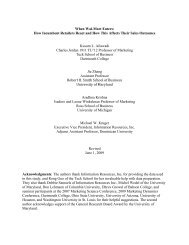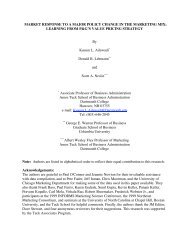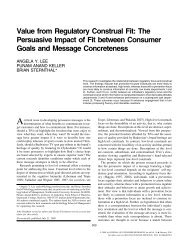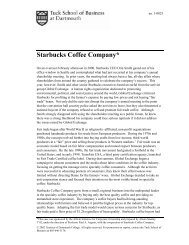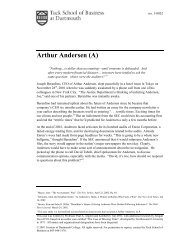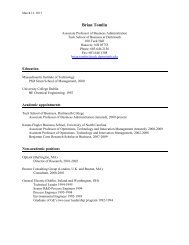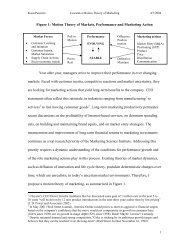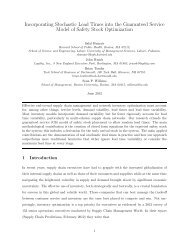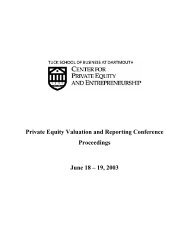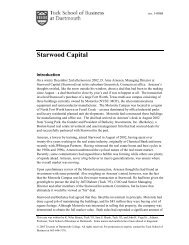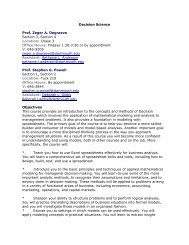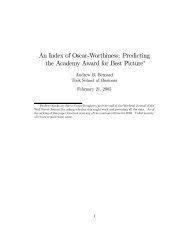tax notes international - Tuck School of Business - Dartmouth College
tax notes international - Tuck School of Business - Dartmouth College
tax notes international - Tuck School of Business - Dartmouth College
Create successful ePaper yourself
Turn your PDF publications into a flip-book with our unique Google optimized e-Paper software.
SPECIAL REPORTS<br />
provides the most reliable evidence <strong>of</strong> the arm’s-length<br />
price <strong>of</strong> the platform contributions depends on a number<br />
<strong>of</strong> factors, including the reliability <strong>of</strong> the determination<br />
<strong>of</strong> the relative values <strong>of</strong> the platform contributions<br />
for purposes <strong>of</strong> the residual pr<strong>of</strong>it-split method,<br />
and the extent to which the acquisition price <strong>of</strong> the<br />
company can be reliably adjusted to account for<br />
changes in value over the period between the acquisition<br />
and the formation <strong>of</strong> the CSA and to account for<br />
the value <strong>of</strong> the rights and in-process research done by<br />
Company X that does not constitute platform contributions<br />
to the CSA. It is also relevant to consider<br />
whether the results <strong>of</strong> each method are consistent with<br />
each other, or whether one or both methods are consistent<br />
with other potential methods that could be applied.<br />
Transition Rules<br />
The proposed regulations included transition rules<br />
for existing qualified cost-sharing arrangements. Grandfather<br />
treatment would have been terminated in some<br />
events, including the occasion <strong>of</strong> a periodic trigger as a<br />
result <strong>of</strong> a subsequent PCT, a material change in the<br />
scope <strong>of</strong> the arrangement, such as a material expansion<br />
<strong>of</strong> the activities undertaken beyond the scope <strong>of</strong><br />
the intangible development area, or a 50 percent or<br />
greater change in the ownership <strong>of</strong> interests in costshared<br />
intangibles. Commentators objected to the<br />
grandfather termination events.<br />
The temporary regulations do not terminate the<br />
grandfather treatment upon a 50 percent change <strong>of</strong><br />
ownership or on account <strong>of</strong> a subsequent periodic trigger<br />
or a material change in the scope <strong>of</strong> the arrangement.<br />
The temporary regulations instead adopt a targeted<br />
provision that applies the temporary regulations’ periodic<br />
adjustment rules to PCTs that occur on or after<br />
the date <strong>of</strong> a material change in the scope <strong>of</strong> a grandfathered<br />
CSA. A material change in scope would include<br />
a material expansion <strong>of</strong> the activities undertaken<br />
beyond the scope <strong>of</strong> the IDA. For this purpose, a contraction<br />
<strong>of</strong> the scope <strong>of</strong> the CSA, absent the material<br />
expansion into one or more lines <strong>of</strong> research and development<br />
beyond the scope <strong>of</strong> the IDA, does not constitute<br />
a material change in the scope <strong>of</strong> the CSA.<br />
Whether a material change in scope has occurred is<br />
determined on a cumulative basis. Therefore, a series<br />
<strong>of</strong> expansions, any one <strong>of</strong> which is not a material expansion<br />
by itself, may collectively constitute a material<br />
expansion.<br />
An arrangement in existence on January 5, 2009,<br />
will be considered a CSA if before that date it was a<br />
qualified cost-sharing arrangement under Treas. reg.<br />
section 1.482-7, but only if the written agreement is<br />
amended if necessary to conform with, and only if the<br />
activities <strong>of</strong> the controlled participants substantially<br />
comply with, the provisions <strong>of</strong> the new rules by July 6,<br />
2009. Temp. Treas. reg. section 1.482-7T(m) sets forth<br />
specific rules for how the temporary regulations apply<br />
to existing CSAs.<br />
Other Regulations<br />
Entity Classification<br />
The IRS finalized regulations to make the federal<br />
<strong>tax</strong> classification <strong>of</strong> the Bulgarian public limited liability<br />
company (aktsionerno druzhestevo) consistent with the<br />
federal <strong>tax</strong> classification <strong>of</strong> public limited liability companies<br />
organized in other countries <strong>of</strong> the European<br />
economic area: a per se corporation. (For the final<br />
regs, see Doc 2008-25013 or 2008 WTD 230-26.)<br />
Conduit Financing Arrangements<br />
The IRS and Treasury proposed regulations under<br />
sections 881 and 7701(l) dealing with conduit financing<br />
structures. (For the proposed regs, see Doc 2008-26696<br />
or 2008 WTD 246-27.) Treas. reg. section 1.881-3 allows<br />
the IRS to disregard the participation <strong>of</strong> one or more<br />
intermediate entities in a financing arrangement in<br />
which the entities are acting as conduit entities, and to<br />
recharacterize the financing arrangement as a transaction<br />
directly between the remaining parties to the financing<br />
arrangement for purposes <strong>of</strong> imposing <strong>tax</strong> under<br />
sections 871, 881, 1441, and 1442.<br />
Since the publication <strong>of</strong> Treas. reg. section 1.881-3,<br />
the IRS and Treasury issued the so-called check-thebox<br />
regulations. The preamble to the newly proposed<br />
regulations states that Treasury and the IRS are aware<br />
that issues have arisen regarding the proper treatment<br />
<strong>of</strong> disregarded entities under Treas. reg. section<br />
1.881-3. These proposed regulations clarify that a disregarded<br />
entity is a person under Treas. reg. section<br />
1.881-3. Thus, transactions that a disregarded entity<br />
enters into will be taken into account for purposes <strong>of</strong><br />
determining whether a financing arrangement exists.<br />
The preamble also states that the IRS and Treasury<br />
are continuing to study conduit financing arrangements<br />
and may issue separate guidance to address the treatment<br />
under those regulations <strong>of</strong> some hybrid instruments.<br />
Specifically, the IRS and Treasury are studying<br />
transactions in which a financing entity advances cash<br />
or other property to an intermediate entity in exchange<br />
for a hybrid instrument that is treated as debt under<br />
the laws <strong>of</strong> the foreign jurisdiction in which the intermediate<br />
entity is resident and is not treated as debt for<br />
U.S. federal <strong>tax</strong> purposes.<br />
The issue is whether these instruments should constitute<br />
a financing transaction under the section 881<br />
regulations. One possible approach, the preamble<br />
states, is to treat all transactions involving these hybrid<br />
instruments between a financing entity and an intermediate<br />
entity as financing transactions. Comments are<br />
requested. Another possible approach is to add additional<br />
factors to consider in determining when stock in<br />
a corporation (or other similar interest in a partnership<br />
470 • FEBRUARY 2, 2009 TAX NOTES INTERNATIONAL<br />
(C) Tax Analysts 2009. All rights reserved. Tax Analysts does not claim copyright in any public domain or third party content.



